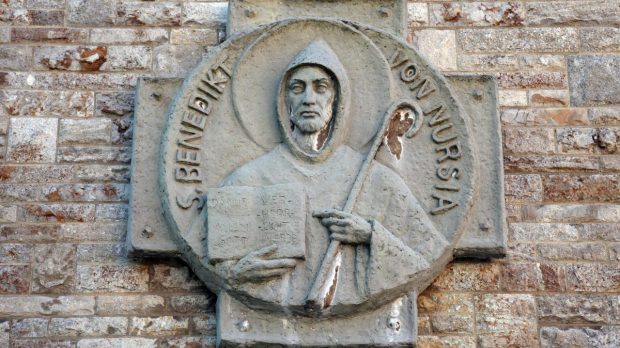Lenten Campaign 2025
This content is free of charge, as are all our articles.
Support us with a donation that is tax-deductible and enable us to continue to reach millions of readers.
St Benedict of Norcia is regarded the Father of Western Monasticism. He is also one of the Patron Saints of Europe, and of our Pope Emeritus Benedict XVI, who made a retreat at the saint’s own Subiaco monastery just before his elevation to the Papacy.
Although I am a very bad Benedictine, I do my poor Oblate best to honor our founder, today, whose Holy Rule has shaped and defined monasticism for both Benedictines and Trappists and has even been adopted by corporations looking for a healthier and more productive way to effectively build their teams.
St. Benedict teaches that growth comes from accepting people as they are, not as we would like them to be. His references to the stubborn and the dull, the undisciplined and the restless, the careless and the scatterbrained have the ring of reality. Though Benedict was no idealist with respect to human nature, he understood that the key to spiritual progress lies in constantly making the effort to see Christ in each person — no matter how irritating or tiresome… Stability means that the monastic pledges lifelong commitment to a particular community. To limit oneself voluntarily to one place with one group of people for the rest of one’s life makes a powerful statement. Contentment and fulfillment do not exist in constant change; true happiness cannot necessarily be found anywhere other than in this place and this time. For Benedictines, stability proclaims rootedness, at-homeness, that this place and this monastic family will endure. Likewise, by fidelity to the monastic way, Benedictines promise to allow themselves to be shaped and molded by the community — to pray at the sound of the bell when it would be so much more convenient to continue working, to forswear pet projects for the sake of community needs, to be open to change, to listen to others, and not to run away when things seem frustrating or boring or hopeless. –Source
Sharing his thoughts on the film, Of Gods and Men, Bishop Robert Barron brings up the lesson that freedom comes from detachment, not just of things, but of our very lives and feelings. This begins, of course, with a detachment from the material, and in today’s reading of the Rule, here is what we find:
Whether Monks Ought to Have Anything of Their Own This vice especially is to be cut out of the monastery by the roots. Let no one presume to give or receive anything without the Abbot’s leave, or to have anything as his own — anything whatever, whether book or tablets or pen or whatever it may be — since they are not permitted to have even their bodies or wills at their own disposal; but for all their necessities let them look to the Father of the monastery. And let it be unlawful to have anything which the Abbot has not given or allowed. Let all things be common to all, as it is written, and let no one say or assume that anything is his own.
Obviously, an oblate — living in the world and not “in community” — must adapt the Rule to his/her situation. For me, detachment means not owning a lot of stuff (and I still own more than I should) or more than I actually need. I still chuckle to recall an office co-worker who exasperatedly asked me if I didn’t something other than than the same two pair of shoes I wore, day-after-day, to work. She really didn’t understand why I didn’t need more than two pair.
But it is something I clearly struggle with and must ponder and pray on a great deal more. I must invite the grace of detachment into my life more fully — detachment from food, which is a crutch and a comfort; detachment from my fierce opinions, and from ego and all ambition. I like this article on the singing Benedictines at Abbaye Notre Dame l’Annonciation: “I really loved clothes,” one nun admits, “but there’s freedom in wearing my habit.”
It is a counter-cultural, radical way to live in a world where we are constantly told to get more, be more, buy more. Benedict’s Rule was written in the 6th century, and it is less than 100 pages long, yet it speaks through the ages, to our own, and challenges our whole lifetime. I can’t imagine any Christian library being complete without it.
Read more:
The Liberating Power of the St. Benedict Medal

